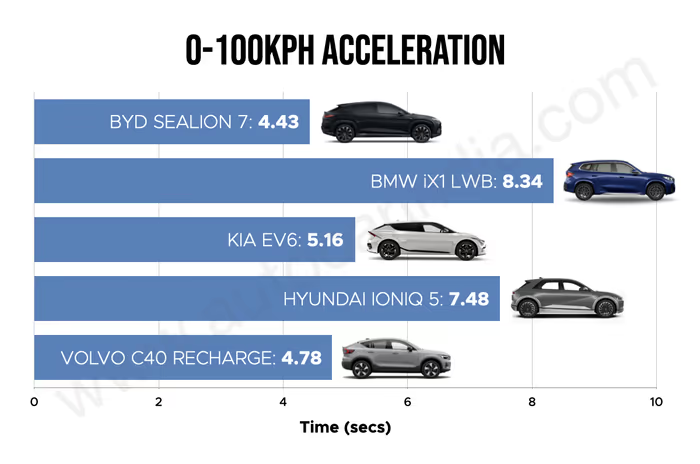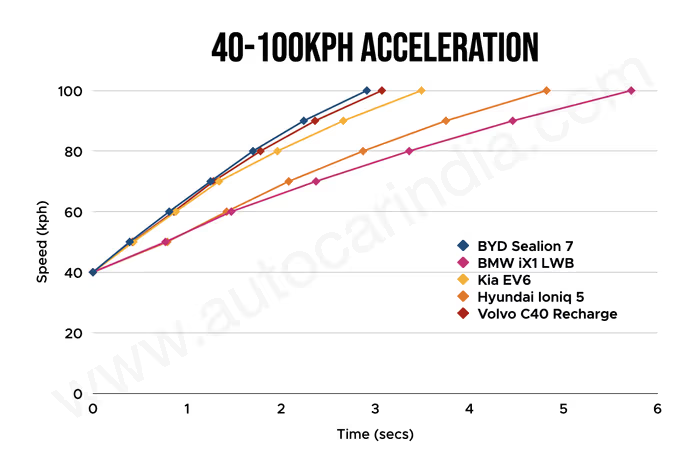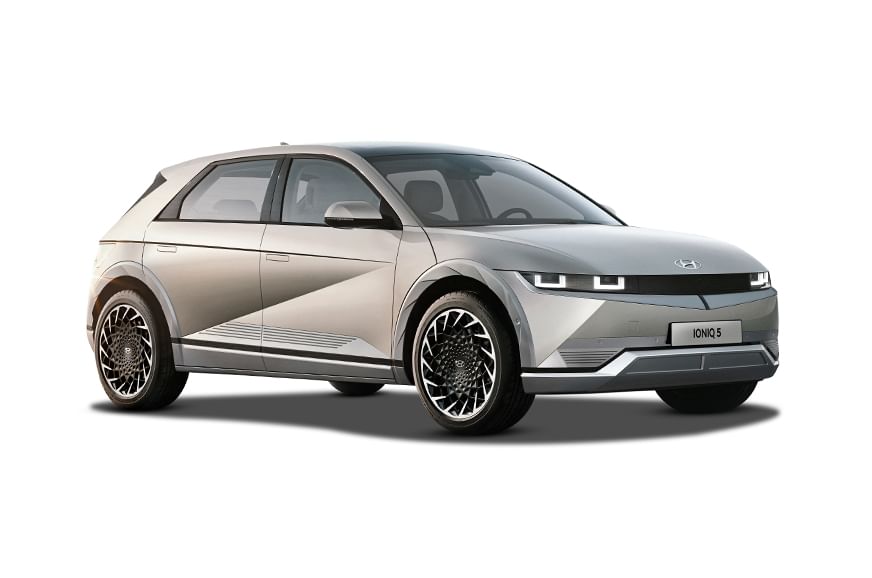BYD Sealion 7 real world performance vs rivals
We find out which all-electric premium crossover offers the best performance for your money.
Published On Jun 02, 2025 03:51:00 PM
16,470 Views
Follow us onThe premium electric crossover space has been heating up in recent times. Formerly populated by the Volvo C40 Recharge, Kia EV6 and Hyundai Ioniq 5, the segment has seen two new contenders this year in the form of the BMW iX1 LWB and BYD Sealion 7. Let’s take a look at how all five EVs stack up against each other when it comes to performance.
BYD Sealion 7 vs BMW iX1 LWB, Kia EV6, Hyundai Ioniq 5 specifications
Sealion 7 makes the most power, but EV6 has bigger battery
| BYD Sealion 7 vs BMW iX1 LWB, Kia EV6, Hyundai Ioniq 5, Volvo C40 Recharge specs | |||||
|---|---|---|---|---|---|
| Sealion 7 | iX1 LWB | EV6 | Ioniq 5 | C40 Recharge | |
| Battery capacity (kWh) | 82.56 | 66.4 | 84 | 72.6 | 78 |
| Electric motor setup | Dual motor, front and rear | Single motor, front | Dual motor, front and rear | Single motor, rear | Dual motor, front and rear |
| Power (hp) | 530 | 204 | 325 | 217 | 408 |
| Torque (Nm) | 690 | 250 | 605 | 350 | 670 |
| Drive layout | AWD | FWD | AWD | RWD | AWD |
| Range (km) | 456 (WLTP) | 531 (MIDC) | 663 (MIDC) | 631 (MIDC) | 530 (WLTP) |
| Kerb weight (kg) | 2,340 | 2,085 | 2,150 | 2,015 | 2,110 |
| Power-to-weight ratio | 226.50hp per tonne | 97.84hp per tonne | 151.16hp per tonne | 107.69hp per tonne | 193.36hp per tonne |
| Torque-to-weight ratio | 294.87Nm per tonne | 119.90Nm per tonne | 281.40Nm per tonne | 173.69Nm per tonne | 317.53Nm per tonne |
The Sealion 7’s 82.56kWh battery, dual-motor setup doles out the highest output here – 530hp and 690Nm in the top-spec Performance trim we tested. The recently-launched EV6 facelift has a slightly larger battery at 84kWh, but its dual-motor configuration develops 325hp and 605Nm, while its platform sibling – the Ioniq 5 – comes equipped with a 72.6kWh battery, single-motor arrangement that’s good for 217hp and 350Nm. Notably, the Ioniq 5 is the only rear-wheel drive EV here.
iX1 LWB is front-wheel drive and has the smallest battery pack
Another unique drive layout in this comparison is that of the iX1 LWB, whose 66.4kWh battery powers a single motor on the front axle, making it front-wheel drive. This powertrain has the lowest output among its rivals, producing 204hp and 250Nm. Despite having the third-largest battery here at 78kWh, the C40 Recharge, manages to crank out the second-highest output - 408hp and 670Nm - via its dual-motor setup.
EV6 has highest claimed range
Coming to range, the hierarchy is very different. First place is claimed by the EV6 thanks to its 663km range, with the Ioniq 5 coming in second with a 631km figure. The iX1 LWB’s 531km range secures it third place, while the C40 Recharge's 530km range slotting in just after. Last place is occupied by the Sealion 7, which can travel up to 456km (482km for Premium trim) on a single charge. However, it's worth noting that the Sealion 7 and C40 Recharge range figures are based on the global WLTP test cycle, while the others are based on the Indian MIDC cycle.
BYD Sealion 7 vs rivals 0-100kph time
All-wheel drive Sealion 7 and C40 Recharge are the quickest off the line

Unsurprisingly, the Sealion 7's 690Nm torque output and all-wheel drive layout allow it to reach the 100kph mark from rest in a brisk 4.43 seconds, which is very impressive given its size and heft. This is followed closely by the C40 Recharge at 4.78 seconds - just 0.35 seconds off the BYD crossover - while the EV6 took 5.16 seconds to complete the 0-100kph run.
Then comes the rear-wheel drive Ioniq 5 with a 7.48sec dash from rest to 100kph. Finally, the iX1 LWB comes fifth, with the front-wheel drive BMW EV taking 8.34 seconds to clock 100kph.
BYD Sealion 7 vs rivals rolling acceleration time
Results mirror the 0-100kph tests


20-80kph and 40-100kph acceleration times tell a similar story, with the Sealion 7 completing both tests in 2.48 seconds and 2.91 seconds, respectively. The C40 Recharge stays right on the heels of the BYD crossover with a 2.69sec 20-80kph run and a 3.07sec time in the 40-100kph dash. In third place comes the EV6, taking 2.77 seconds to reach 20-80kph and 3.49 seconds for 40-100kph.
Next up is the Ioniq 5, which sprinted from 20-80kph in 4.12 seconds and from 40-100kph in 4.82 seconds. Taking 4.83 seconds and 5.72 seconds for the 20-80kph and 40-100kph tests respectively, the iX1 LWB sits at the bottom of the performance rankings.
| BYD Sealion 7 vs BMW iX1 LWB, Kia EV6, Hyundai Ioniq 5, Volvo C40 Recharge rolling acceleration | |||||
|---|---|---|---|---|---|
| Sealion 7 | iX1 LWB | EV6 | Ioniq 5 | C40 Recharge | |
| 20-80kph time (sec) | 2.48 | 4.83 | 2.77 | 4.12 | 2.69 |
| 40-100kph time (sec) | 2.91 | 5.72 | 3.49 | 4.82 | 3.07 |
BYD Sealion 7 vs rivals price
The BYD Sealion 7 price starts at Rs 48.90 lakh for the base Premium trim and tops off at Rs 54.90 lakh for the Performance trim tested here, while the Kia EV6's Rs 65.97 lakh price tag makes it the most expensive EV in this comparison. Both the Sealion 7 and EV6 are sold as CBUs (completely built units) in India, so they attract higher import tariffs.
C40 Recharge is second-most expensive despite CKD status
This gives the Hyundai Ioniq 5 and BMW iX1 LWB the all-important price advantage, since they're assembled in India as CKD (completely knocked down) models. To that end, the iX1 LWB costs Rs 49 lakh for its sole eDrive20L M Sport trim, and the Ioniq 5 takes the affordability crown with its Rs 46.05 lakh price tag. Interestingly, while the Volvo C40 Recharge is a CKD model too, it carries the second-highest asking price here at Rs 59 lakh.
| BYD Sealion 7 vs BMW iX1 LWB, Kia EV6, Hyundai Ioniq 5, Volvo C40 Recharge price | |||||
|---|---|---|---|---|---|
| Sealion 7 | iX1 LWB | EV6 | Ioniq 5 | C40 Recharge | |
| Price (Rs, lakh) | 48.90-54.90 | 49 | 65.97 | 46.05 | 59 |
Autocar India's testing standards
Before we conduct our EV performance tests, we check and maintain tyre pressures based on the manufacturer’s recommendation and ensure the car is fully charged. The car is then tested in a controlled environment with two people on board, and the data is collected via highly accurate GPS-based timing equipment.
All prices ex-showroom, India.
Also see:
Kia EV6 facelift real world range tested, explained
Hyundai Creta Electric or MG Windsor: which EV should you buy?
Copyright (c) Autocar India. All rights reserved.











Comments
Member Login
Personal Details
No comments yet. Be the first to comment.